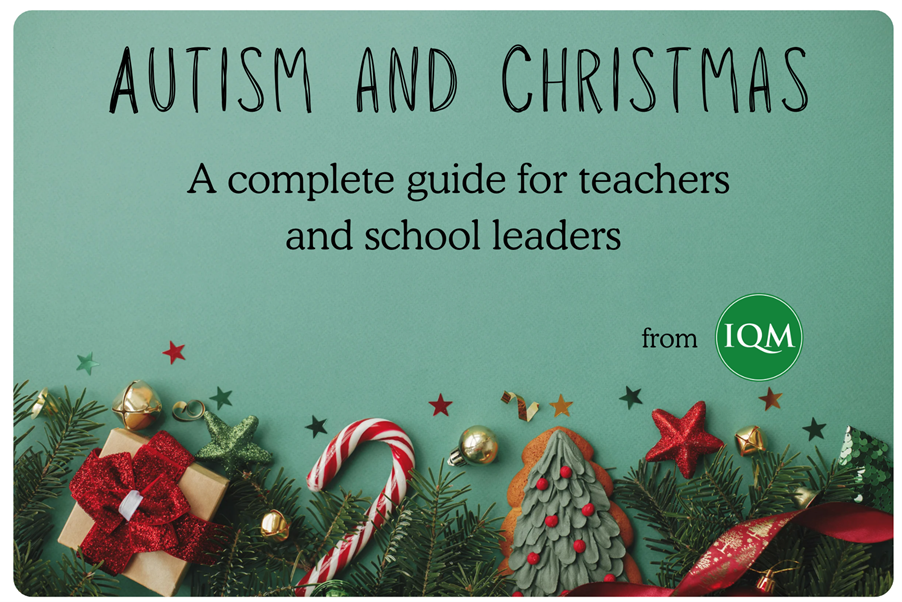Who is IQM?
IQM is the only national inclusion award in the UK. For over 20 years and in over 20 countries, schools, MATs and Local Authorities use the Inclusion Quality Mark to recognise exemplary inclusive practice.
Get in touch for your FREE school information pack today.
The Olive School Achieves Centre of Excellence
May 9, 2024
The Olive School has achieved the Inclusive School Award with Centre of Excellence status.
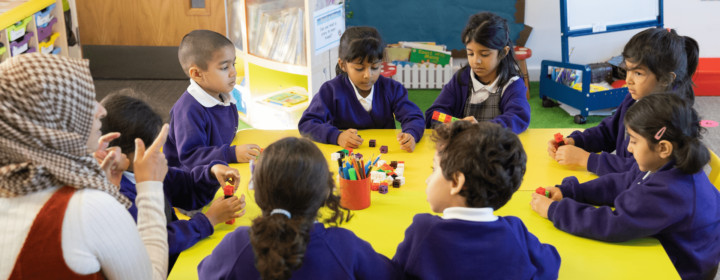
Overwhelming Demand From Local Community
The Olive School in Blackburn is an inclusive three-form entry Muslim faith-based primary school that opened in September 2013. They promote fundamental British values and welcome applications from all faiths and from families who do not have a religious belief. The Olive School is very popular due to the overwhelming demand from the local community for a high-achieving and inclusive school. They are valued for responding to the aspirations of local families and are growing a positive community every day.
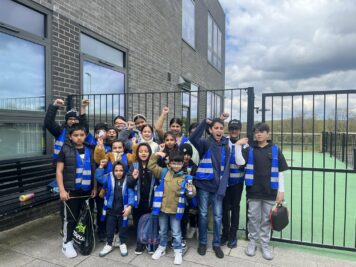
The school embraces the values of self-discipline, compassion, mutual respect for all people regardless of differences and also respect for the earth itself. These fundamental values underpin the Muslim faith and tie into the overall British society. The school is very aware that they live in a multi-cultural society and they want their pupils to develop into confident, articulate young people who will grow into great role models within society.
Highly Skilled and Motivated
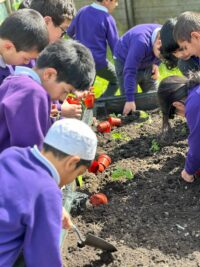
The range of experience that leaders have cultivated and encouraged at The Olive School is highly skilled and motivated. The Olive School stands out for its strong leadership and innovative approach to education, evident from the initial meeting with them. Their thorough preparation for the IQM assessment, including a comprehensive special needs’ audit, reflects their commitment to continuously improving their provision for students with diverse needs. Over recent years, they have responded to increased demand and achieved notable successes in this area, positioning themselves as a hub of special needs support within the local network of schools. Through interactive workshops that engage both children and parents, they foster a collaborative learning environment where everyone can grow together. This common-sense approach, coupled with their dedication to innovation, has resulted in remarkable academic progress and simultaneous advancements for children with additional needs. Furthermore, The Olive School’s outward-facing approach ensures that children are exposed to a diverse range of cultures, growing understanding and empathy beyond the confines of their immediate community.
The learning walk during the first day took in KS1 and Early Years learning environments. The emphasis on shared planning and purposeful work promotes a collaborative atmosphere where students are encouraged to explore and learn independently. With helpful prompts such as “teach like a star” and the “I do/we do/you do” approach, class staff are equipped with effective strategies to engage and empower students at every level. Staff autonomy is valued, allowing for the implementation of innovative ideas that enhance the learning experience. From the outset of a child’s journey, The Olive School instils prominent values and a sense of responsibility and independence. Subtle yet purposeful adaptations in the classroom environment contribute to a calm and engaging atmosphere, conducive to learning and growth.
Nurturing Environment
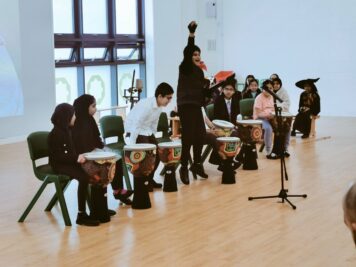
The children from KS1 were open, articulate and helped paint a clear picture of their experience. The Olive School exudes a nurturing environment where students from KS1 confidently express their passions and talents. During the meeting with these children, their enthusiasm for subjects like geography, story writing, and mastering times tables was palpable. They spoke fondly of a safe and supportive atmosphere where making mistakes is seen as part of the learning process.
The love for art shines through as they eagerly share their experiences of creating sculptures and collages. Appreciative of the efforts of lunchtime staff, these students understand the importance of teamwork and respect for all members of the school community. Teachers are commended for their thorough explanations, emphasising key vocabulary to deepen understanding. Pride in their work is evident and a culture of helping others to thrive as students willingly assist their peers with translations and offer support whenever needed.
Children are taught to take pride in their work and this is a part of having self-respect. The KS1 ‘Book Look’ clarified this. During the comprehensive ‘Book Look’ conducted across all levels and classes, it became evident that high expectations are firmly embedded in every aspect of the curriculum. Thematic and engaging projects showcase a consistent standard of excellence, with a clear emphasis on skill progression and the celebration of individual interests. The curriculum is thoughtfully designed to cater to diverse learning needs, incorporating reflective “green time” and picture symbols to facilitate communication.
Practical marking techniques ensure feedback is constructive without overwhelming students or staff. Opportunities for dialogue and expression, such as in performance poetry, promote a supportive learning environment where every voice is valued. Furthermore, the curriculum reflects a commitment to inclusivity, with a deliberate effort to incorporate cultures beyond the children’s immediate experience. This balanced approach between written and practical work builds a rich and immersive learning journey for all students.
Wellbeing Champions

During the first day, there was a meeting with children who held roles related to responsibility. Pupils in key roles within the school are empowered to take on leadership responsibilities, as demonstrated by interactions with the Head Boy, Head Girl, and Wellbeing Champions. The Head Boy and Girl enthusiastically described their roles which involve hosting open evenings, giving presentations, and aspiring to become tomorrow’s leaders. They view their positions as valuable preparation for future challenges, relishing the opportunity to represent their peers and share ideas with school leaders. Similarly, the Wellbeing Champions exhibit genuine empathy and sensitivity towards their peers, providing fair and objective support while maintaining initiatives such as ‘feelings boxes’. Collaborating on key events within the school, they demonstrate confidence and a commitment to addressing the varied needs of their fellow students, embodying the values of leadership and compassion instilled at The Olive School.
The school benefits from the invaluable contributions of its dedicated Governors who exemplify a commitment to continuous improvement and student welfare. Having initially started as parent Governors, they have evolved their roles to effectively balance the need for support and challenge, ensuring a high standard of education. With a strong standing in the community, they make regular visits based on their areas of expertise, fostering diplomatic relationships with families and staff. Their involvement extends beyond administrative duties as they provide fresh perspectives on curriculum development, health and safety, and site enhancement.
Serving as a constant line of communication, they instil confidence in school leaders through years of successful collaboration. Proud of the school’s staff retention and cultural inclusivity, they actively contribute to building bridges within the community. They express gratitude for strides made in special needs support, particularly embracing the All Stars approach, which they view as indispensable in recording and celebrating incremental successes.
SEND Leadership is Excellent
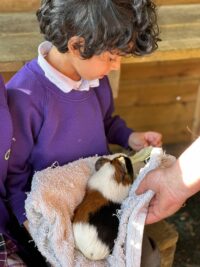
The Special Educational Needs and Disabilities (SEND) leadership is excellent. They demonstrate a proactive and innovative approach to supporting students with diverse needs. Through in-house training initiatives, they ensure maximum staff participation and effectiveness, with a focus on continuous improvement and relevance to individual children. Special Needs Assistants are actively engaged in peer-to-peer training, fostering a culture of collaboration and skill-sharing. By closely monitoring and adapting support strategies, they ensure that interventions are tailored to the specific needs of each child. Furthermore, they are committed to expanding large-scale training programs, such as emotion coaching, to further enhance support provision. Utilising Education Health and Care plans, they analyse trends and develop targeted programs of study to optimise learning outcomes.
Time management is carefully orchestrated to facilitate collaboration among staff members, allowing for face-to-face interaction and the sharing of best practices. Passionate and skilled in their roles, they prioritise making reasonable adjustments to accommodate children’s needs and disseminating key messages among staff on a daily basis. Their proactive approach extends to preparing for children’s arrival on site, ensuring that individual needs are thoroughly understood and planned for well in advance. Through their efforts, they have developed a realistic and aspirational curriculum tailored to the needs of all children, reflecting their unwavering commitment to inclusive education.
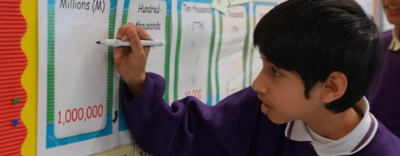
A meeting with Leaders was held at the end of the first day to further understand the ethos and aims of the school from their point of view. It became evident that their role extends far beyond administrative tasks; they perceive themselves as integral “leaders of learning” within the classroom. They are determined to set an example and inspire others through their dedication to fostering a culture of continuous improvement. Recognising the intrinsic link between wellbeing and academic performance, they prioritise wellness as the cornerstone of effective learning. This approach not only promotes student welfare but also enhances overall performance. Their commitment to prioritising wellness to break down barriers to learning was both refreshing and illuminating, providing clarity on the examples observed throughout the school. By emphasising the importance of wellbeing in conjunction with academic achievement, The Olive School’s leaders demonstrate a forward-thinking approach to education that prioritises the holistic development of every student.
The Special Needs Assistants bring a cohesive and selfless team dynamic, where pooling talents is second nature. Drawing from diverse backgrounds, including prior experience in nursery-based special needs assessment and support, they continuously enhance their skills and knowledge through mutual collaboration. Their exceptional communication skills serve as the glue that keeps class teams fluid and confident in supporting students with challenging needs. In times of adversity, they band together, responding to needs with unwavering dedication. Moreover, they feel valued and appreciated for their contributions, with numerous examples highlighting the support provided by school leaders during difficult moments. Collaborating closely with the Special Educational Needs Coordinators (SENCos), they recognise the importance of nurturing independence in the children they support, underscoring their commitment to fostering special needs development within the school community.
Inspirational Stories
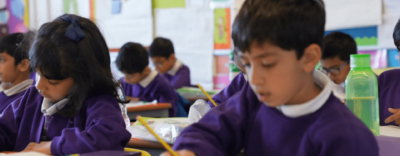
Experienced and newer Career Teachers, ranging from early career to longstanding professionals have a common ethos of dedication to mastering their roles as part of their vocation. Despite varied paths, they share a commitment to supporting each other’s success, growing a culture of collaboration and growth. Inspirational stories abound, showcasing instances where the school’s supportive environment enabled teachers to overcome challenges and ultimately thrive. This collective support has not only empowered them to excel professionally but has also allowed them to become role models admired by the students. In environments lacking such nurturing support, the creativity and inspiration of these teachers might have been lost to the profession due to trying times. Fortunately, at The Olive School, resilience and care for one another are central tenets, ensuring a vibrant community where both teachers and students can flourish.
Our Assessor got to see the group of KS2 children and it became evident that the school really has a welcoming and inclusive environment where students of varying abilities and needs thrive. Despite facing complex learning challenges, these students exude friendliness, confidence, and empathy, displaying maturity beyond their years. Embracing diversity as a strength, they support each other with communication needs and appreciate the structure provided by the “do now” part of lessons. Openly sharing their school experiences, they enthusiastically engage with topics such as Vikings, fractions and life skills, demonstrating a thirst for knowledge and growth. Their positive perception of rewards and the accessibility of Wellbeing Champions further highlight the school’s commitment to nurturing student wellbeing. Overall, interacting with these students was a joy, underscoring The Olive School’s dedication to creating a supportive and inclusive learning environment.
High Standards
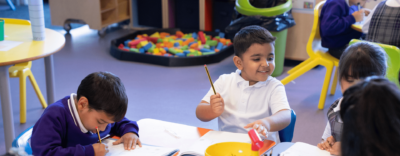
The KS2 ‘Book Look’ was very clearly and markedly an example of high standards and consistency. This was evidence that learning seamlessly flows between year groups and classes. The care and respect the children have for their work is key, with practical and theory-based lessons both given ample time to develop within each lesson. The marking system is concise and clear, benefiting both children and staff, with maths examples and “stamp it” sections effectively conveying key messages. Children with Special Educational Needs receive high levels of bespoke work in their books and through other means, ensuring that the quality of their work aligns with that of their age-related peers. Symbols are again consistently used to support understanding and presentation standards are uniformly high across the school, contributing to cohesive learning.
During a KS2 learning walk, clear objectives guided the observation process, ensuring a balanced approach between discussion and practical application. The medium-term planning was well-organised, complemented by individualised weekly plans. This allowed teachers and class teams to take ownership of their respective subjects and lessons. Enrichment opportunities were evident, ensuring thorough coverage of each subject area with equal weighting. Teachers skilfully integrated human elements into what could otherwise be solely fact-based lessons, using simulation and discussion to contextualise vocabulary and deepen understanding. Classroom culture reminders served to reinforce positive behaviours and attitudes, effectively building teachers’ toolkits for creating a supportive and engaging learning environment.

In one of the final meetings, with the Principal and the IQM Lead, our Assessor was able to give a clear and comprehensive assessment against every element of the IQM Inclusive School Award, enriched by specific examples. The school’s values, evident from the initial meeting, underscore the importance of academic success alongside compassionate care for those most in need, recognising that these elements synergise to create tangible success across all areas. Analysis of parent, Governor, and staff interviews highlighted a strong collective commitment to the school’s ethics and ethos, with stakeholders demonstrating a deep understanding of the rationale behind decision-making processes. Both parents and children trust the school implicitly, reflecting the sensitivity, supportiveness, and exemplary behaviour modelled by the school community. Ultimately, the positive examples set at The Olive School are mirrored in the conduct and character of its students.
Find out more about the IQM Inclusive School Award
If your school is interested in obtaining the IQM Inclusive School Award or you wish to talk to a member of the IQM team please telephone:
028 7127 7857 (9.00 am to 5.00 pm)
or email: admin@iqmaward.com for further details.
Want more information on the IQM Award? Click here to request your free IQM information pack.
Other Posts

About IQM
The only national award for inclusion in the UK, IQM has been committed to recognising exemplary inclusive schools for over 20 years and in over 20 countries around the world. The three awards allow schools and organisations to celebrate their inclusive practice against nationally recognised framework.
Site Links
© 2026 Inclusion Quality Mark | website developed & cared for by digidoda

